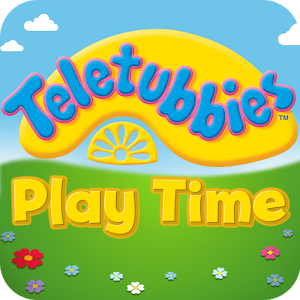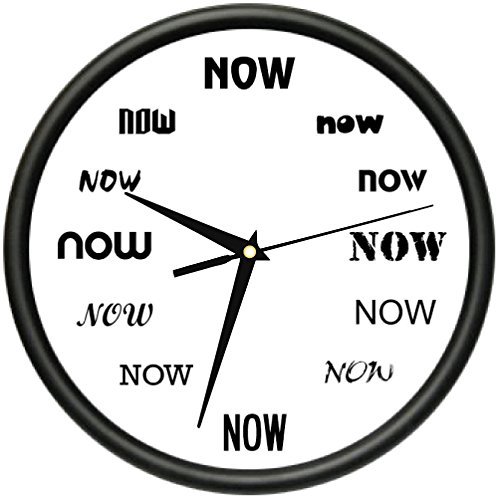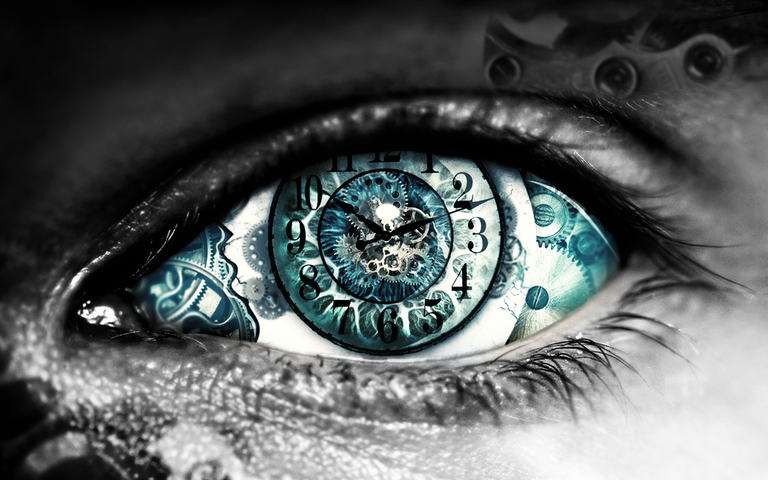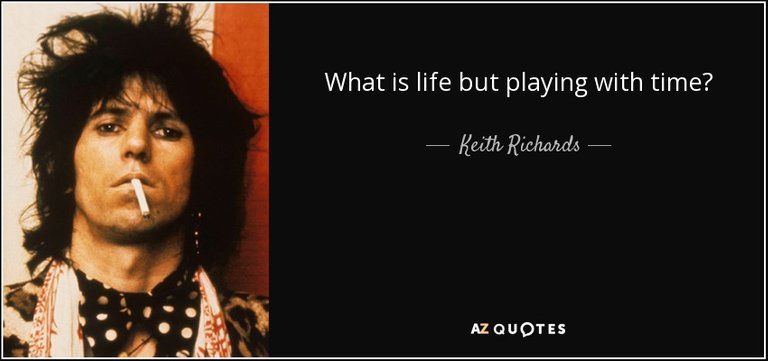Getting a grip on time à la Paul Ricoeur
Time is a child at play, moving pieces in a game. Kingship belongs to the child
~ Heraclitus
Time is a difficult subject to philosophize on. Since ancient times many wise men have been breaking their teeth on it. The Christian philosopher Aurelius Augustine once famously wrote: "What, then, is time? When no one asks me, I know; If I wish to explain it to someone who asks, I do not know.” One of the difficulties with thinking about time is that you can’t get out of it. There is no vantage point outside of time that allows you to study it from a distance. We are always already in time.

Source: Google play store
In this way we are like fishes in water. A fish lives his whole life in the water and doesn’t ‘know’ anything about water, except for that it is the thing he swims in. To be able to see it from a distance, he should jump out of the water and contemplate about it there. This, of course, is impossible, because out of the water the fish dies (and also because fishes don’t contemplate, but that’s irrelevant here). The same principle applies for philosophers and scientists thinking about time. Philosophers and scientists are human beings too, and are therefore always bound by an existence in time. Stepping outside of time (is this even conceivable?) would certainly stop all thinking as well.
The only way to think about time therefore is in relation to ourselves and our experience of it. This is also what the French philosopher Paul Ricoeur (1913-2005) did. According to him, we create our own understanding of time, by means of stories. In stories we give a sense to our existence, and get a grip on time. In what follows I will elaborate on answer to the riddle of time. For time to exist there must be a present, a past and a future, but this appears to be more problematic than it seems.
The Riddle of Time
There are roughly two ways to think about time. On the one side we have the objective time, the time of the clock and of physics. This is the time thought of as it would exist separately from our existence. It is a time of the cosmos and can be measured. Think of it as the variable ‘t’ in Newtonian physics or a dimension in the Einsteinian concept of spacetime. I am aware that these conceptions of time are very different, but they are equal in the objectifying of time (as it is something that doesn’t need to be perceived to be there).
On the other side we have the subjective time of our experience. This is the time that we live our lives trough and that is always there. It is always subjective and can not be measured. Think of it as the time of our consciousness or of the soul. It’s a private time and we can never escape it.
One could say: “sure, very nice, so we have a subjective side and an objective side to time, what’s the deal? Isn’t this true for everything in this world that we perceive?” Yes this is true, but there is a problem here. For these ways to think about time seem incompatible with each other! This problem arises from the fact that on the one hand, objective time, in it’s essence (separated from all perspective), has no present, and therefore no past and no future.
It consists of hours, days, years and centuries that follow each other. In this time everything happens. Moments follow each other for eternity (from the big bang on). Things move, fall apart, come together, but without a (human being with) consciousness all moments are equal in the sense that no moment is a ‘now’. There has to be someone in that time, who is conscious of all the things happening around him, to define the present as the moment at which he does this definition.
The subjective time on the other hand does have a ‘now’. The problem here is just that it is always now. We conscious beings always live in the present. Here we get to the notorious skeptical argument against the existence of time. Because what is the present? When you blink your eyes it is already over, and replaced with a new present. When you say, "the present is now", the present is already over when you say “now”. The present has no duration, and what has no duration does not exist. Moreover, the past does not exist anymore, and the future is not yet. So subjectively, we are having a past, a present and a future that neither exist, while objectively there is not even a present, but only moments that follow each other. So what now?

Source: Amazon.com
The Solution: the Story
Although the argument points to this, It would still be rather strange for you to conclude that time does not exist. This is because while reading this Steemit blog, you have an experience of time. You have started reading and have maintained this for a while. It would be very odd to find out, during your reading experience, which is in time, that there is no time! It would be like experiencing the non-existence of experience, and this simply makes no sense.
What then is this experience of time? According to Ricoeur, it is important to notice that our consciousness is spread out in time. There is more to consciousness than just a sequence of now-moments. For in our everyday experience, we are not only aware of the now, but also have memories of the past, and expectations for the future. Every moment of the day our consciousness is filled with all sorts of memories and expectations, which we constantly update and adjust.
Your reading of this blog also works like this. You don’t read letter by letter, but you read words that form phrases and sentences. These phrases have a meaning and add on each other to form a whole ‘in your head’. In other words, you are constantly interpreting my story here, by remembering what has been said and forming an expectation for what will come, on the basis of your memory. When your expectation isn’t met with what I say next, you readjust your interpretation to make it fit, so to say. And so on, and so on.
This process of interpreting and readjusting our expectations is called hermeneutics. This is widely used in literature and philosophy to understand texts and theories. Ricoeur now brilliantly suggests that we have to think about our lives in a similar way. Conscious life is a constant anticipation on a future that is expected on the basis of a memory of the past. Time then is not something that is given to us, or something that we passively undergo, but we create it ourselves. Anticipating a future based on our memories in the present is time. Without this conscious effort there simply would be no time, because there would just be moments following each other without any present, or there would just be a constant present, with no past or future. Living as a human being means being conscious and being conscious means having an image and an understanding of the world around you, to be able to anticipate the future.

Source: allpoetry.com
We form an image of the world around us by using our senses, but also by means of stories, according to Ricoeur. That is, our memories (and predictions for the future) can be structured like a story. Stories are about the past, but are more than just an enumeration of everything that has happened before. In a story there is a plot, a 'red thread'. In stories we make a selection out of the facts from the past, and connect them in such a way that they get a structure, sense and meaning. By following the red thread of our own story, we can predict the future as it were, and we understand what we need to do to proceed in the story. By thinking about our life in terms of a story we give it a meaning. The story spreads out in time and with the dynamics of hermeneutics it literally lives in us. The present for Ricoeur is like a scene in a story. By thinking and remembering, we browse back and forth in the book of our lives, so to speak. This way the past comes into existence as history, and so does the future, since ‘history is never finished’.
The beautiful thing now, is that we can create this story of our lives for a large part by ourselves. You can't change the facts from the past, but you can connect them in different ways. You can pay less attention to one fact, and more to the other. If you are really creative you can make disturbing life facts into minor events, or even into a major pillar of a strong identity. Even so, the smallest events such as a blink of an eye can get a meaning that is far beyond their mere objective being. In this way you can really play with the time. I believe Heraclitus must have meant something like this when he wrote about time being a child at play. And probably good old Keith as well: 
I’d like to thank you for taking the time to read through all of this and I hope the above will help you to create an amazing story of your own life. I’ve tried to be as clear as possible, but things that are clear to me might not be so to you. So feel free to ask me any question you want. That’s it for now, play on Steemians!
Sources:
Paul Ricoeur: Time and Narrative
Internet Encyclopedia of Philosophy
Heraclitus: Fragments
http://www.iep.utm.edu/ricoeur/
http://www.heraclitusfragments.com/files/e.html
Congratulations @roydestory! You have completed some achievement on Steemit and have been rewarded with new badge(s) :
Click on any badge to view your own Board of Honor on SteemitBoard.
For more information about SteemitBoard, click here
If you no longer want to receive notifications, reply to this comment with the word
STOP